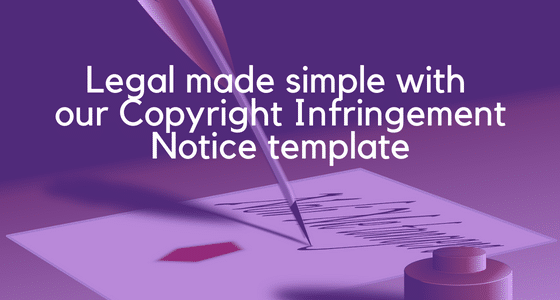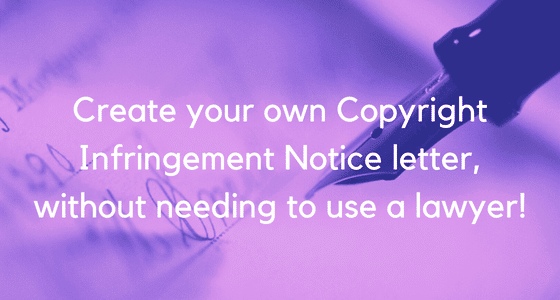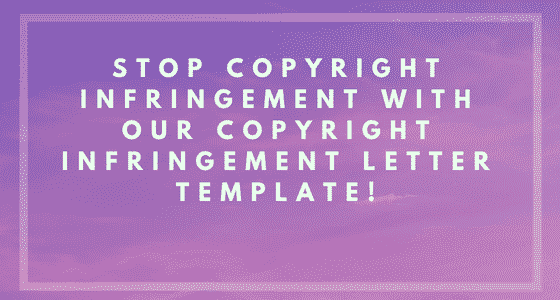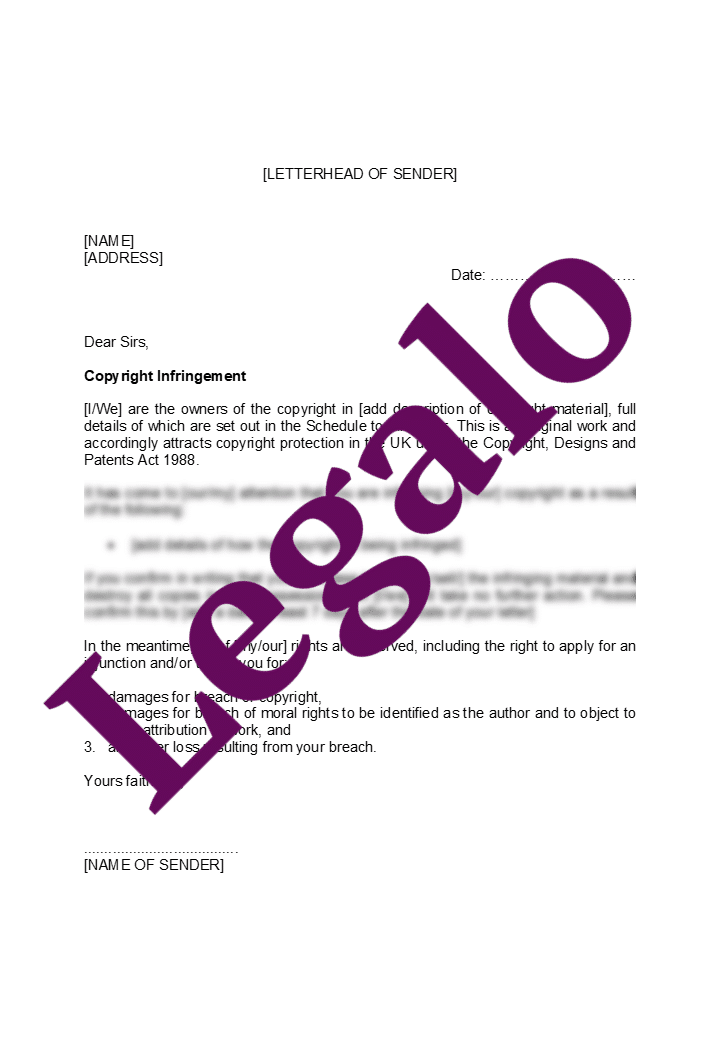Copyright Infringement Notice Letter
Our Copyright Infringement Notice Letter template:
- UK solicitor-drafted copyright infringement letter template
- Simple-to-edit template – with full guidance notes
- Warn another party to stop infringing copyright
- Save on legal fees by drafting the letter yourself
- Our full money-back guarantee

How Does It Work?
-
1. Download
-
2. Edit
-
3. Print
-
4. Sign
Use our Copyright Infringement Notice Letter template to notify an individual or a business that they have infringed your copyright. The letter warns them that you will take legal action if they do not cease the copyright infringement.
Copyright in the UK and the use of a copyright infringement notice letter
In the UK the Copyright, Designs and Patents Act 1988 governs copyright. Under this law, an owner of copyright has a range of legal rights. These include:
- Damages for breach of copyright;
- Damages for breach of moral rights to be identified as the author and to object to false attribution of work;
- An injunction to prevent further infringement of copyright; and / or
- An order for the handing over of any articles / materials that breach the copyright.
However, taking legal action is expensive and time-consuming. Accordingly, you may be happy simply to require that the copyright infringement ceases. You’ll often hear of this type of letter being referred to as a ‘cease and desist’ letter. That means that unless the infringing party stops doing what they are doing, you will take formal legal action.
If you are concerned only with copyright breach on the Internet, then you may prefer to use the following resources:
- initially, Copied Content Complaint Letter template;
- followed by DMCA Take Down Notice template.
Using Our Copyright Infringement Notice Letter
A UK Solicitor has drafted our infringement letter template, to ensure that it covers all that is legally needed. This letter acts as a copyright infringement warning notice. The law does not set out any specific format for a copyright infringement notice, but, to comply with the Civil Procedure Rules, you do need to set out what the infringing action is that you are claiming breaches your copyright.
When you download the letter, you can then edit it to cover your specific circumstances in Microsoft Word. You will need to set out a description of what you have that has copyright protection. You will also need to set out what the infringing party has done wrong.
Once you have edited the letter template, then you will need to delete any square brackets that remain. Once you have completed editing the template, you can save it in Word or PDF format.
FAQs on the Copyright Infringement Notice Letter
Below we address the most popular questions from the Internet on this topic.
How do I write a copyright infringement notice?
Writing a copyright infringement notice is very like writing a business letter. You must be sure to incorporate certain details into the letter you are writing. By using our template you will make sure that you have included all those details. At only £9.95, it is so easy to use our version to make sure you cover all the content that you should set out in such a letter.
What happens if you get a notice of copyright infringement?
If you have infringed copyright then you may be liable for damages. The other party may pursue their claim through the Civil Courts. The letter is treated as a letter before action, i.e. a warning that they may issue legal proceedings. If you ignore it, this means you can be liable for both damages and their legal costs if they are successful in suing you.
What copyright disclaimer should I use?
A “copyright disclaimer” is a bit of a misnomer. Most people mean a “copyright notice” when they refer to this. A copyright notice is a simple statement that you are claiming copyright in the work. It might be as simple as using the copyright symbol, i.e. ©, and your name and the date or year.
A true “copyright disclaimer” is usually something people use who are intentionally infringing someone else’s work by using it without permission and they say they will stop using it if the owner objects. This is of no legal help, as they can still be fined for breach.
Is notice required for copyright infringement?
Before you sue someone for copyright infringement of one of your works, you do need to give them written notice that you have caught them infringing your copyright. This is called a letter before action. This sort of warning before you issue legal proceedings allows you to claim your legal costs from them if you are successful in court.
How do you say no copyright infringement intended?
If you breach copyright, it is of no use to say you do not intend to infringe it. Clearly you do or you would not have used someone else’s image or written work, etc without permission. So this disclaimer is of little use. There is an exception where you use just a small part of a larger work, such as making a quote from a book. The right way to treat this is to keep the quote short and acknowledge the author of the words and where they come from (which book, etc). In that case you don’t need to say, “No copyright infringement intended”.
Is copyright infringement a serious crime?
It is a serious crime in a commercial setting (e.g. you are importing and reselling bootleg works) and the police or trading standards may be notified. In USA, there are enormous potential fines for copyright infringement, and you may have seen warning notices about this at the start of DVDs when you play them.
Has anyone gone to jail for copyright infringement?
The maximum jail term for copyright infringement is 10 years in prison in the UK. As well as a prison term, the court may order you to pay an unlimited fine.
Is copyright infringement arrestable?
Yes, see above. Since 2002, when the maximum prison sentence was increased to 10 years, copyright breach has been seen as a serious arrestable crime in the UK.
What is an example of a proper copyright notice?
It is a short sentence that makes it clear that (a) copyright protects your work and (b) it is not available for use by the general public. Use the copyright symbol, your name and the date or just the year.
What are 3 ways to infringe copyright?
You would be breaching copyright if you were to (just a few examples):
- Perform a play without the author’s specific consent;
- Show a film to the public without consent to do so;
- Producing unauthorised copies of a work without consent.
How do you escape copyright infringement?
Basically, don’t use other people’s work including images. This includes any images you can find via a Google search – someone will own the copyright in them. So even though you can find the image for free, it does not mean you can use it for free. If you want to use an image, you are better off searching for one on an image library, where you can pay their royalty fee and know you have got permission to use it.
The same applies to written works as it does to images. You should not copy written information that you found somewhere, such as on the Internet. As with images, someone will own the copyright in those articles.
You must always obtain permission from whoever has produced the work in order to reproduce it in any way. You should expect to have to pay a licence fee for this. The only special case is, in the case of written works, to copy just a short quote, so long as you give credit to the author.
Does your Material have Copyright Protection?
Before issuing a letter for infringement of copyright, you need to satisfy yourself that your work attracts copyright protection. In the UK there is no need to register copyright in order for it to exist. Copyright exists automatically when you create an original literary, musical or artistic work. Copyright also covers original sound recordings. Read our free in depth guide to copyrighting music for more details on copyright protection for music.





